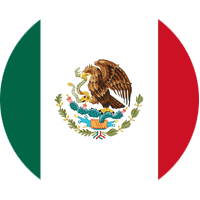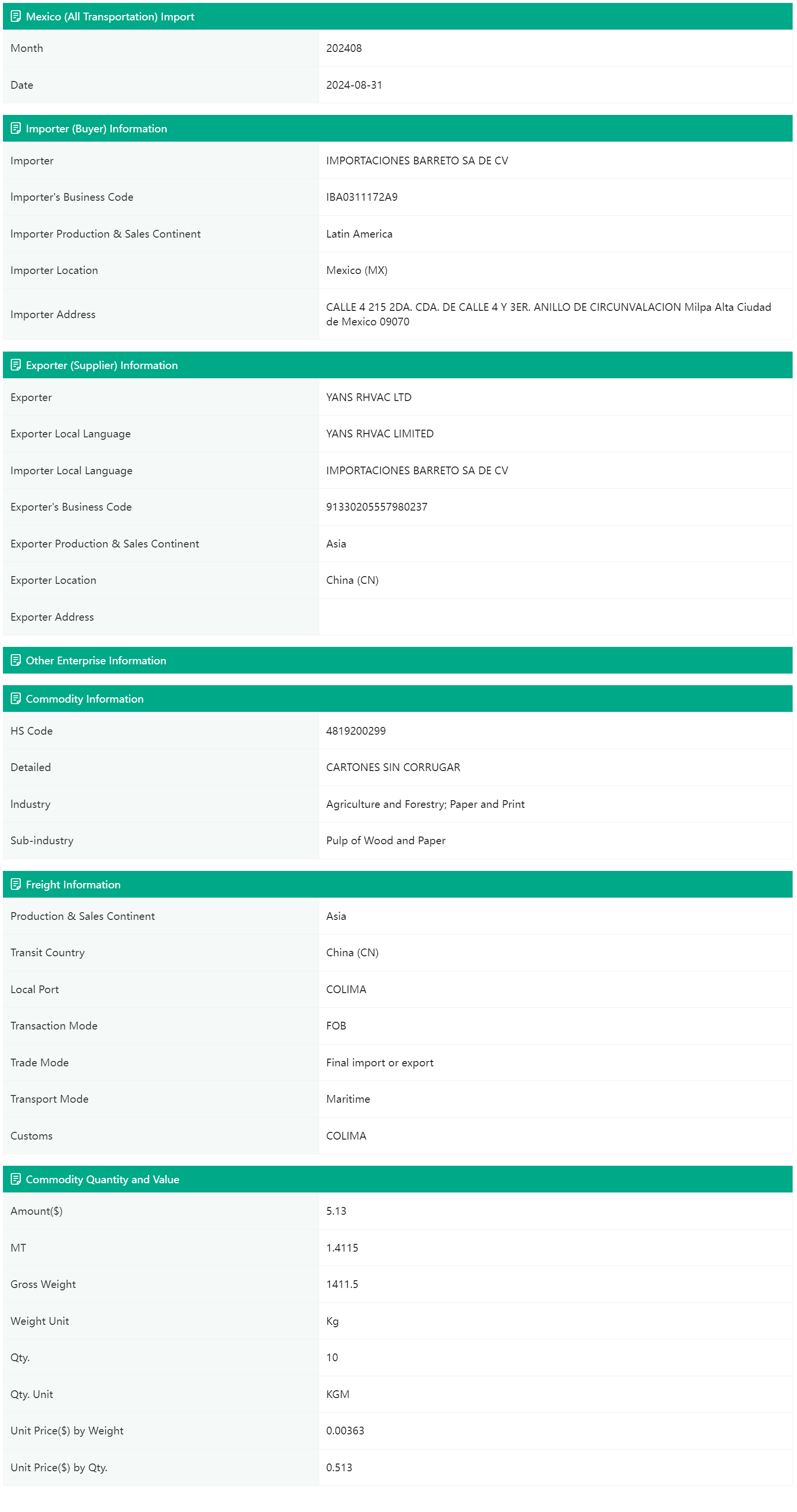Please Sign in to view recently saved searches.
Mexico is located in North America. It shares a border with the United States to the north, is bordered by the Pacific Ocean on the south and west sides, is adjacent to Belize, Guatemala and the Caribbean Sea on the southeast, and is bordered by the Gulf of Mexico on the east.
The official language of Mexico is Spanish, and English is the first foreign language.
Mexico is a major economic power in Latin America, a member of the United States-Mexico-Canada Agreement (formerly the North American Free Trade Area), and one of the world's most open economies. It has signed free trade agreements with 50 countries.
【Agriculture】
Agriculture is one of the economic pillars of Mexico. Mexico has obvious advantages in agricultural exports. The main export products include food crops such as wheat, corn, and sorghum, fruits such as avocados, grapes, lemons, and mangoes, berries such as blackberries, strawberries, and cranberries, as well as frozen shrimp, tuna, beef, and pork. Mexican beer and tequila are renowned around the world. As the national liquor of Mexico, tequila has the world's largest export volume. 99% of the world's tequila is produced in Jalisco.
In 2019, Mexico became the tenth largest agricultural exporter in the world. The export earnings of agricultural products exceeded those of oil, tourism, and remittances. According to data from the Bank of Mexico, in 2022, Mexico's agricultural export value was 49.927 billion U.S. dollars, and the import value was 44.327 billion U.S. dollars, with a surplus of 5.6 billion U.S. dollars. It has maintained a trade surplus for ten consecutive years. In August 2024, Mexico's agricultural export value was 1.9211 billion U.S. dollars.
【Industry】
Manufacturing is the pillar of Mexico's economic industry. More than 80% of Mexico's export earnings and about a quarter of its total GDP value come from manufacturing. Manufacturing includes more than 20 industries such as steel, automobiles, chemicals, electronics, metal processing, machine manufacturing, food, textiles, paper, clothing, rubber, and pharmaceuticals. In 2022, Mexico's exports of industrial manufactured goods (excluding petroleum products) reached 508.422 billion U.S. dollars, an increase of 16.59% year-on-year, accounting for nearly 90% of Mexico's total export value.
Among industrial fields, the more important sectors are the mining industry, the petroleum industry, the textile and clothing industry, and the automotive industry. Mexico is one of the major oil-producing countries in Latin America. The petroleum industry plays an important role in its economy. The export income of petroleum products is the main source of Mexico's fiscal revenue. The automotive industry is Mexico's largest manufacturing sector and a pillar industry. Mexico is a major global automotive producer and exporter, mainly exporting to the United States.
(1) Mining industry
Mexico is the world's largest silver producer (Peru and China rank second and third). Gold, copper, lead, zinc, molybdenum, and fluorite production are all among the top ten in the world. According to data from the Mexican Mining Chamber (CAMIMEX), due to the impact of the Russia-Ukraine conflict and the decline in precious metal prices, Mexico's mining output value decreased by 5.3% in 2022 to 316.955 billion pesos (about 15.751 billion U.S. dollars); Mexico's total mineral export value was 8.387 billion U.S. dollars, a decrease of 3.63% year-on-year, accounting for 1.45% of Mexico's total export value.
(2) Petroleum industry
Mexico is the fourth largest oil producer in the Western Hemisphere, after the United States, Canada, and Brazil. The petroleum industry makes a significant contribution to Mexico's economy. According to statistics from the Bank of Mexico, in 2022, Mexico's export value of petroleum products reached 38.972 billion U.S. dollars, an increase of 32.6% year-on-year, accounting for 6.75% of Mexico's total export value. Crude oil export value was 31.625 billion U.S. dollars, accounting for more than 80% of the total export value of petroleum products. Mexico's import demand also remains strong. In the same year, the country's import value of petroleum products was 74.114 billion U.S. dollars, an increase of 37.63% year-on-year, accounting for 12.26% of Mexico's total import value. The trade deficit of petroleum products further expanded to 35.142 billion U.S. dollars. Mexico is rich in petroleum resources and has great potential for offshore oil development. Oil export income plays an important role in Mexico's fiscal revenue. The largest export market for Mexican petroleum products is the United States.
Petróleos Mexicanos (PEMEX) is Mexico's largest oil and petrochemical company and one of the largest state-owned enterprises in Latin America. In 2022, PEMEX's average oil production was 1.7846 million barrels per day, an increase of 1.6% year-on-year. Among them, the export volume was 953,200 barrels per day, and the export revenue was 31.085 billion U.S. dollars, the highest level since 2018. The main export markets are the Americas, the Far East, and Europe.
(3) Automotive industry
The automotive industry is a pillar industry of Mexico's national economy and also the largest sector of manufacturing and the industry that attracts the most foreign direct investment (FDI). Mexico has a relatively complete industrial system. It is the world's seventh largest automotive production base. Its production of light vehicles and heavy vehicles ranks high in the world. At the same time, it is also the fourth largest producer of auto parts. In 2022, Mexico produced 3.5091 million vehicles, an increase of 9.83% year-on-year, gradually recovering from the impacts of the global semiconductor supply shortage and tight logistics schedules caused by the epidemic. Light vehicle exports were 2.8656 million units, an increase of 15.57% year-on-year.
(4) Food industry
In recent years, Mexico's food processing industry has developed rapidly, mainly due to the rich raw materials for food processing, stable macroeconomy, strong industrial competitiveness, and Mexico's signing of trade agreements with 50 countries and regions, providing a platform for exports. The main export destinations of processed food from Mexico are the United States, Japan, and Canada. Large food-related enterprises:
—Fomento Económico Mexicano (FEMSA) is the largest beverage company in Latin America and the second largest company in the Coca-Cola system globally.
—Grupo Bimbo is Mexico's largest state-owned baking and food company. Its products include bread, milk, biscuits, etc., and are sold in 19 countries in the Americas, Asia, and Europe, with more than 10,000 products and more than 100 brands.
—Grupo Alfa. The group is composed of five major businesses: petrochemicals (Alpek), aluminum parts (Nemak), frozen food (Sigma Alimentos), electronics and telecommunications (Alestra), and natural gas and hydrocarbons (Newpek). The group operates in 23 countries, has more than 50,000 employees, and nearly half of its business is carried out overseas.
—Mexican beverage company Arca Continental.
—GRUMA, a Mexican producer of tortillas and flour.
【Foreign trade】
Mexico has signed 14 free trade agreements (FTAs) with more than 50 countries and regions, 32 reciprocal promotion and protection of investment agreements with 33 countries and regions, and 9 economic complementary free trade agreements. Mexico is an active participant in multilateral and regional forums such as the World Trade Organization (WTO), the Asia-Pacific Economic Cooperation (APEC), the Community of Latin American and Caribbean States (CELAC), and the Latin American Integration Association (ALADI). At the same time, Mexico is also a member of mechanisms such as the Organization for Economic Cooperation and Development (OECD), the Comprehensive and Progressive Agreement for Trans-Pacific Partnership (CPTPP), and the Pacific Alliance (Alianza del Pacifico).
The countries with which Mexico has signed free trade agreements include the United States, Canada, Colombia, Chile, the European Union, Israel, Norway, Iceland, Switzerland, Luxembourg, Japan, Uruguay, Peru, El Salvador, Honduras, Guatemala, Nicaragua, Costa Rica, Panama, Colombia, Chile, Peru, Brunei, Malaysia, Singapore, Australia, New Zealand, Vietnam, etc.
To encourage exports, Mexico basically exempts major export products from export tariffs. In terms of imports, if the country of origin of the product has a free trade agreement with Mexico, imports are basically tariff-free, while other countries levy a certain amount of tariffs.
On August 15, 2023, the Mexican president signed a decree. From August 16, the most-favored-nation tariffs on various imported products such as steel, aluminum, bamboo products, rubber, chemical products, oil, soap, paper, cardboard, ceramic products, glass, electrical equipment, musical instruments, and furniture will be increased. The decree will increase import tariffs on 392 tariff items, mainly targeting countries with which Mexico does not have a free trade agreement. Almost all products in these tariff items are now subject to a 25% import tariff, and only certain textiles will be subject to a 15% tariff. This revision of the import tariff rate took effect on August 16, 2023 and will end on July 31, 2025.
From January to July 2024, Mexico's total imports were 359.745 billion U.S. dollars. By transportation mode, the proportions were: road transportation 46.67%, sea transportation 35.19%, air transportation 10.18%, rail transportation 6.85%, and other transportation methods 1.11%. Mexico's total exports were 354.176 billion U.S. dollars. By transportation mode, the proportions were: road transportation 65.71%, sea transportation 17.63%, air transportation 3.85%, rail transportation 12.44%, and other transportation methods 0.36%.
In August 2024, foreign trade information indicates a trade deficit of 4,868 million dollars. This balance is compared to the deficit of 1,278 million dollars in the same month of 2023.
In the first eight months of 2024, the trade balance showed a deficit of 10,438 million dollars. In the same period of 2023, the deficit was 8,428 million dollars.
**EXPORTS**
In August 2024,, the value of merchandise exports reached 51,915 million dollars, a figure made up of 49,666 million dollars of non-petroleum exports and 2,249 million dollars of petroleum exports. Thus, total exports reported an annual decline of 1.0%, which resulted from a 26.6% reduction in petroleum exports and a 0.6% increase in non-petroleum exports. Within non-petroleum exports, those directed to the United States advanced 2.2% annually while those channeled to the rest of the world declined by 7.7%.
In August 2024 and with seasonally adjusted figures, total merchandise exports showed a monthly decline of 2.77%, which was derived from declines of 2.71% in non-petroleum exports and 4.07% in petroleum exports.
**IMPORTS**
The value of merchandise imports was 56,784 million dollars, an amount that implied an annual growth of 5.7%. This originated from an 8.8% increase in non-petroleum imports and a 26.0% decrease in petroleum imports. When considering imports by type of good, there was an 8.2% increase in imports of intermediate goods, while there were declines of 1.3% in imports of consumer goods and 2.6% in imports of capital goods.
In the month in question and with deseasonalized data, total imports showed a monthly increase of 3.37%, which was a reflection of growths of 3.24% in non-petroleum imports and 5.39% in petroleum imports. By type of good, there were monthly advances of 1.03% in imports of consumer goods and 4.29% in imports of intermediate goods. Imports of capital goods decreased by 0.27%.
【Blooming Trade Data】
Mexican customs data (all transportation) is updated periodically with reliable data sources. Detailed transaction data includes detailed information of importers, exporters, cargo information, freight information, and key price and volume information such as commodity trading volume, transaction amount, and transaction unit price, helping you fully grasp the latest import and export market information in Mexico.
Are you looking to understand market demand in Mexico? Do you want to expand your international presence there? Are you seeking stronger partnerships with clients and reliable suppliers in Mexico?

Sample Data


Would you like to stay informed about your competitors' activities in the Mexican market?
